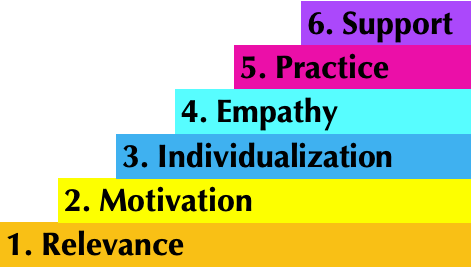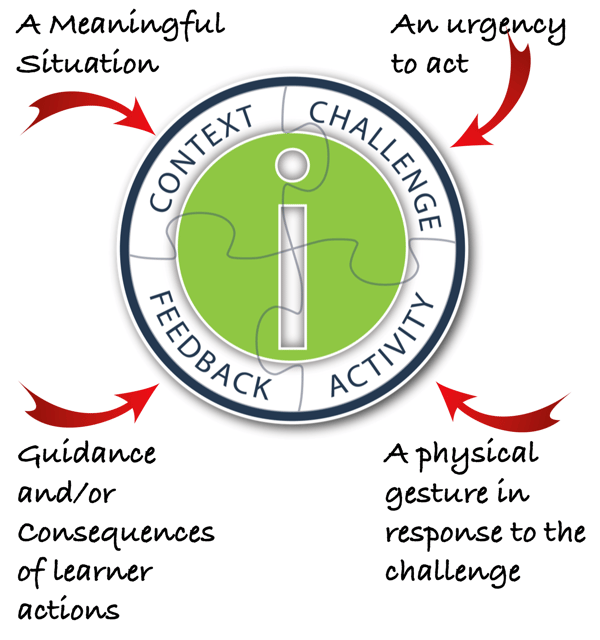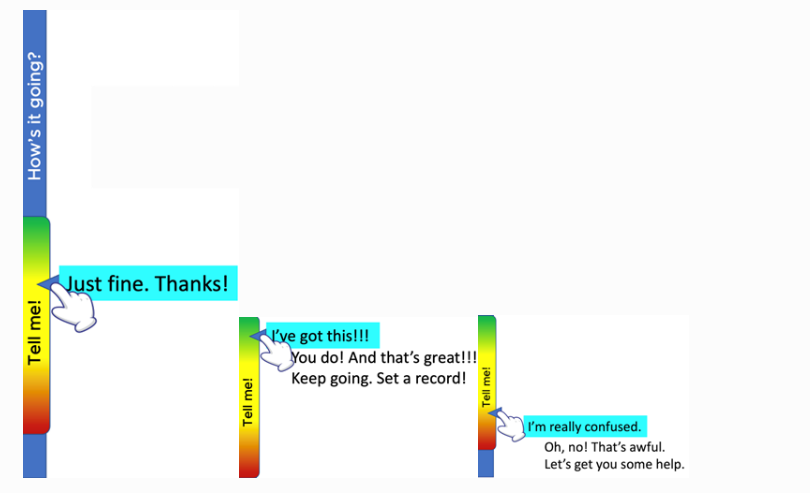Blog
What is e-Learning?

.png?width=1387&height=526&name=2023%20Blog%20Covers%20and%20In-Line%20Graphics%20(49).png)
Deeper Learning™: How to Actually Get the Results You Care About
By Michael Allen | May 03, 2023 | Custom Learning | 0 Comments
What is Deeper Learning™?
Learning experiences range from serendipitous to purposeful. We casually bump into interesting things and hope to remember them, watch YouTube for fix-it clues, and enroll in universities for multiple years of studies to find rewarding jobs.
We are born as learning creatures, learning even before birth, such as discriminating between languages we’ve heard while in the womb and unfamiliar languages. We play games just for the fun of learning to play better and perhaps win. But not all learning is deeply rooted, only to wither in short order. Many things we learn might have been interesting or needed at the time but were quickly forgotten even before any application. Studying for a school exam, for example, often leads to rapid post-exam forgetting. Contributing nothing to an enduring skillset.
Deeper Learning is aptly named because it permeates more broadly, exercises cognition, and makes more robust connections not only in factual and relational memory but also in visual, affective, and, where possible, kinetic memory as well.
Why is it Valuable?
The primary value in learning is twofold: 1) learning creates the ability to perform rewarding and constructive tasks and 2) .earning facilitates further learning.
Ultimately, it isn’t what we know that matters; it’s what we actually do with our knowledge and skills. If we know how to perform a task, but either don’t do it or don’t do it well, the knowledge has very little, if any value. Learning is the pathway and enabler to perform, even if that performance is only understanding, constructive conversation, or the ability to critique the performance of others. The learning that matters is learning that leads to valued performance.
So, how is it that Deeper Learning leads to superior performance? How does it permeate the learner in meaningful, memorable, and motivational ways?
The Six Foundations of Deeper Learning

There are six foundational components as shown at right.
- Briefly, relevance creates interest and leads to attention and engagement.
- Motivation energizes learners to perform the tasks necessary to learn and to subsequently apply new knowledge and skills.
- Individualization optimizes the use of the learner’s time and energy, challenging at the right level for growth, not too little to cause boredom and not too much to cause frustration.
- Empathy recognizes how learners feel about their capabilities and performance and can enhance or prohibit learning. It observes progress, asks learners for input, and adjusts accordingly.
- Practice and application, the foundations of experiential learning, are essential for fortifying and ingraining learning for long-term retention. They set up the use of consequences to learner actions as a powerful and memorable form of feedback.
- Post-learning support refreshes synaptic connections to keep our perceptive abilities, knowledge, and skills keened and ready to serve.
When all or at least most of these components are well designed and developed in instructional programs, they lead to Deeper Learning, which in turn, leads to superior performance quickly and efficiently. And that’s the value of Deeper Learning.
How Do We Create Deeper Learning™?
Of course, there’s no one or right way to create it. As valuable as it is, even inefficient methods can be well worth the time and effort to achieve learning that wastes not one ounce of a learner’s time and energy. But if there are practical and effective ways to go about it, that’s definitely a win/win. Thankfully, we’re finding our primary methodologies in use at Allen Interactions for quite some time are not only amenable but helpful.
CCAF Framework for Interactivity 
Our primary framework for interactive learning comprises four components: Context, Challenge, Activity, and Feedback (CCAF). I’ve written about this and shared the framework many times as have others.
- The Context establishes relevancy for the learner. Instead of trying to convince learners that the learning experience will be valuable (as is often attempted in various ways), we ask learners to imagine themselves in a situation they can easily expect to be in.
- The Challenge energizes and motivates learners to think through the actions they could take and imagine the probable outcomes for each action considered. At this point, we already have active cognition, personal assessment, and affective arousal in the face of a challenge.
- The Activity learners undertake to reflect their thinking and abilities in observable ways. The more authentically we can simulate how a task would be performed, the better for both assessment and transfer of learning to post-training performance.
- Feedback is the primary point of instruction in the CCAF framework. It can be either or both intrinsic, in which learners see the consequences of their actions, or extrinsic which includes judgment and instructive guidance.
Individualization is achieved through responsive feedback to the learner’s observable activity and in subsequent adjustment to the next CCAF cycle. For example, following observed difficulty or even failure, the Challenge can be adjusted, perhaps by just focusing on one component of the previous Challenge. During the Activity, more aids, demonstrations, and hints can be provided. And so on.
Empathy is achieved in part by the adaptive individualization described above and in part by actively asking learners how it’s going and how they’re feeling. Just asking and prompting learners to think about their experiences can deepen learning. Being responsive to feelings amps the effect up.
For example, in one design, a slider appears consistently on a side of the screen. It communicates continuous interest in how the learner is feeling and requests input at any time the learner feels like reporting.

Encouragement, assistance, and opportunities to practice are offered to the learner as a good personal mentor would provide. In Deeper Learning we use experiences, instruction, and practice to produce a competent and confident performer—both are essential outcomes.
Repetition: Repetition and practice are essential to the acquisition of most skills. Because it can be boring, learners often don’t practice enough to deepen their learning to optimal levels. Yet video game designers have mastered techniques to keep people active and glued to screens for hours, sometimes just to learn to click at precisely the right time. As a component of Deeper Learning, we use game-like formats for practice and increase rest periods between practice periods sometimes expanding to days, weeks, and even months. As a component of Deeper Learning, we use game-like formats for practice and increase rest periods between practice periods sometimes expanding to days, weeks, and even months as learning deepens.
Ongoing Support: Finally, just as it’s often easier to keep up with exercise programs over months and years if you engage in it with a partner, ongoing support renews and fortifies learning, not only just for the camaraderie but also to be mindful of proper techniques and putting in sufficient effort.
Deeper Learning for Maximum ROI
Just as not all TV programs are equally entertaining or informative, not all e-learning programs achieve needed and valuable performance improvement. Just delivering a program electronically doesn’t make it good. Much of today’s e-learning is dreadfully boring, fails to apply the science of learning, and wastes precious time and money in addition to loyalty and inspiration. But done right, it can produce invaluable results.
Programs that present a lot of information for the learner to read, listen to, or watch rely on passive learning—the antithesis to XEL, Experience Based e-Learning. We call this superficial or awareness learning. Learners are very unlikely to retain details and find that even shortly after learning they are unable to apply skills and techniques they just observed.
In essence, information barely scrapes by the brain, fails to move from short-term memory to long-term memory, and provides much value at all.
Better than the glancing effects of passive learning, shallow learning occurs when we study for a post-test and then forget much of what we learned quickly. It comes from too little practice, skimming past things not understood with little effort, and not having exercised cognitive patterns sufficiently.
Better programs require thinking, challenge learners to apply skills as they’re developing, and adapt instruction in the process.
e-Learning is much more than a platform for the delivery of slide, audio, or video presentations. Using only those capabilities handicaps the most valuable capabilities e-learning has, which are its abilities to keep learners active and engaged and to individualize and adapt learning experiences as they occur. No other platform has these invaluable capabilities which are too often unrealized.
Cognitive and Affective Learning Creates Lasting Effects
 Deeper Learning™ works to fully engage learners not only cognitively but affectively as well, reaching into both cerebral hemispheres. What does that mean? It means the learning experience constantly assesses how each learner is doing and adjusts appropriately. It lets learners demonstrate their skills when they’re able to do so but quickly jumps in with reminders and increasingly robust measures of assistance as may be needed. But Deeper Learning is much more than that adaptive content and learning aids.
Deeper Learning™ works to fully engage learners not only cognitively but affectively as well, reaching into both cerebral hemispheres. What does that mean? It means the learning experience constantly assesses how each learner is doing and adjusts appropriately. It lets learners demonstrate their skills when they’re able to do so but quickly jumps in with reminders and increasingly robust measures of assistance as may be needed. But Deeper Learning is much more than that adaptive content and learning aids.
How learners think of themselves, such as I’m a terrible artist or I’m great at math, have entirely different personal experiences in the same standard courses in art and math. Few instructional programs delivered through any platform are sensitive to how learners are feeling and express any level of empathy. But they could be. Deeper Learning works to address and accommodate the whole of each learner to make their experience truly personal.
In Summary
Deeper Learning™ is meaningful, memorable, and motivational learning achieved through these foundational components:
- Establishing relevance at the outset and maintaining that relevance in the eye of the learner
- Using motivating techniques, such as having learners perform multi-step tasks showing game-like consequences of each action
- Individualizing the level of challenge and feedback based on observed learner successes and needs
- Asking how learners are feeling in empathetic and non-judgmental ways and responding as would a personal mentor to reported feelings
- Providing enough practice to reach not only proficiency but also to reach such a high level of confidence that learners are actually joyful in applying their new skills
- Making sure there is a community of support to rally themselves and coworkers to maintain the highest level of performance.

About the Author: Michael Allen
Go to https://www.alleninteractions.com/bio/dr-michael-allen Michael W. Allen, PhD, has been a pioneer in the e-learning industry since 1970. For decades, Allen has concentrated on defining unique methods of instructional design and development that provide meaningful, memorable, and motivational learning experiences through enhanced cognitive interactivity. He developed the advanced design and development approaches we have used at Allen Interactions for the past three decades, including CCAF-based design and the SAM process for iterative, collaborative development. Michael is a prolific writer, sought-after conference speaker, and recognized industry leader, having written or edited nine books on designing effective e-learning solutions, including his latest edition: Michael Allen’s Guide to e-Learning. He has contributed chapters to textbooks and handbooks published by leading authors and associations.
Comments
Would you like to leave a comment?
Related Blog Posts
.png?width=316&name=2023%20Blog%20Covers%20and%20In-Line%20Graphics%20(8).png)
By: Michael Allen | Jan, 2023
Category: Custom Learning
.png?width=316&name=2023%20Blog%20Covers%20and%20In-Line%20Graphics%20(41).png)
By: Michael Allen | Mar, 2023
Category: Custom Learning

